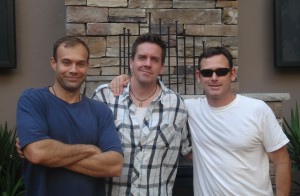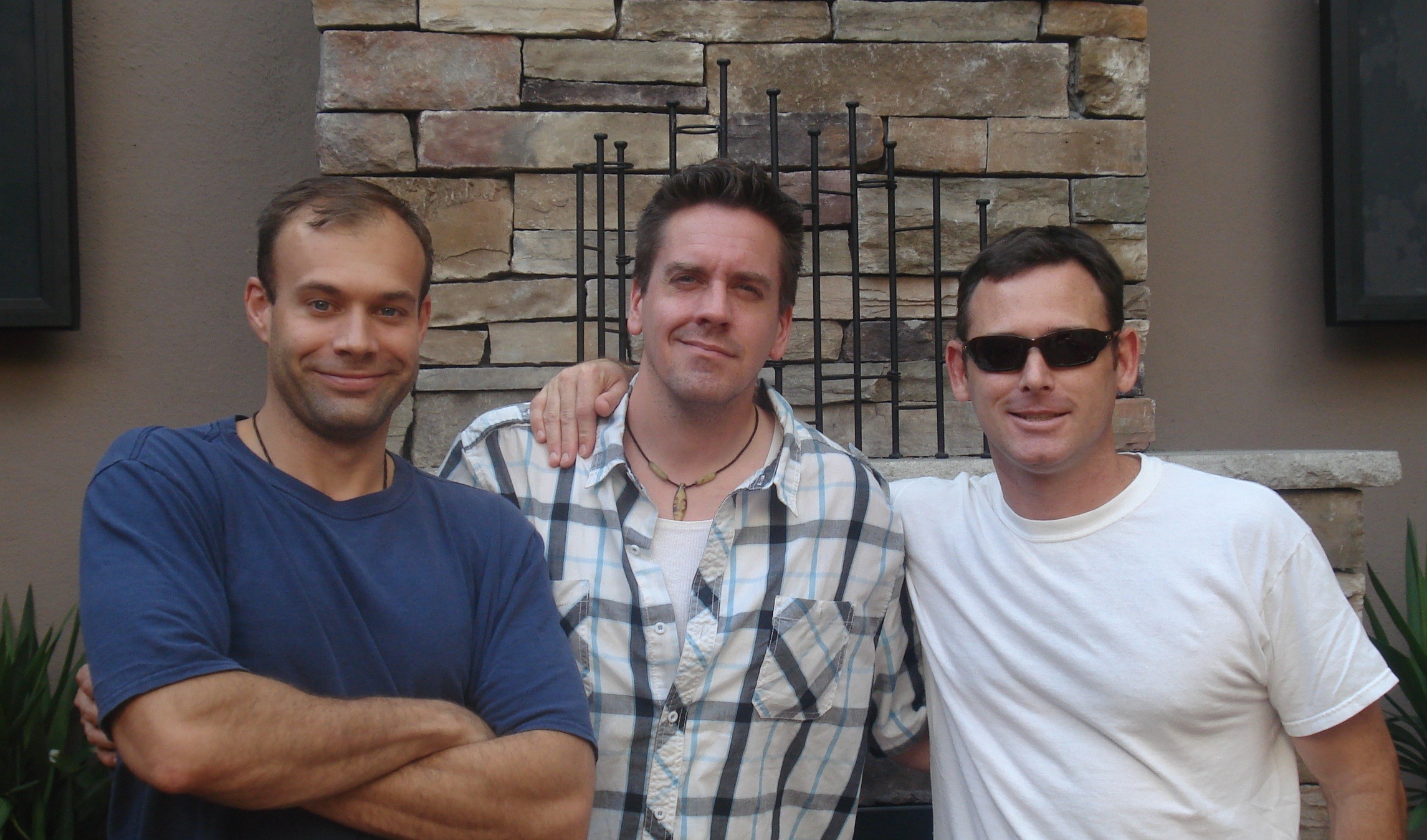
Astoria is home to lots of funny people. I spoke with three of them about their work as comedians and living in Astoria at the Astoria Brewhouse (itself a comedy venue on Wednesday nights): Jesse Joyce, Andy Hendrickson and Keith Alberstadt. They all live close to 30th Ave.
They said that one of the reasons why a lot of comedians live in Astoria is because it is easy to get away. Comedians have to hit the road a lot: from Astoria there is not only quick access to Manhattan but it is easy to get onto the highway via the Triborough Bridge, and La Guardia airport is nearby. As Jesse put it, “they tell you to get to the airport an hour before your flight. I leave my apartment an hour before my flight.”
The three comedians have known each other for about eight years. They even spent thanksgiving together once, at Andy’s parents house, where they came across his first stand up video. “It was terrible,” said Jesse. Then he added, “everybody’s awful the first year or two, or three. You only get good at it after years and years of practice.”
On becoming comedians
Keith: It sounds cliché, but I was the youngest in the family and kind of starved for attention. I always enjoyed making people laugh…I bombed miserably for about five years through college and then things started to get better.
Andy: I was the baby of the family too. I also think it was because we moved around a lot. I was a navy brat.
Jesse: We moved around a lot as well. That really hones your sense of humor. You have to break the ice with 30 new kids in the class, and the best way to do it is probably to make them laugh.
On what it takes to make it in comedy
Jesse: What makes a comedian a good comedian is just doing it for ever. Nobody gets really good at comedy until they’ve been doing it for around 20 to 25 years. Every dude that we respect is in their 40s.
Keith: You need persistence. The reason why it’s so fun and motivating for us and rewarding is because we remember how bad it used to be.
Jesse: It’s the combination of being good at it and keeping pushing through the bullshit of the lifestyle. We’re gone all the time. Some people are really good at it but the lifestyle wears them down after years, so they go on to other things.
Keith: It’s actually a blessing that it’s difficult. If it weren’t, we’d have a thousand more comics.
On why more comedians are male than female
I’d noticed that during our conversation, other comedians were all “dudes”.
Jesse: Yes, about 10 per cent of comedians are women. It’s a kind of an alpha thing to want to do with your life. To feel the need to be on the stage with amplified sound and lighting and all the other people sitting on tiny chairs in the dark. I read a GQ article about this: it also made the point that women have never had to develop a sense of humor, it’s not a thing that they needed to do socially. Because women can get in the door any number of other ways. As a guy humor is kind of important if you want to impress a girl.
Andy: That used to be the only way I met girls. I used to be an awkward guy, from elementary school up through beginnings of high school till I started to figure it out. But I was kind of funny – comedy was definitely important.
On stage weariness and living comedy
Jesse: There are many times when I don’t feel like getting up on the stage. But once I get the first laugh I’m right in there.
Andy: It also works the other way. If you haven’t been performing for say four or five days, you feel you just have to get back onstage. And once you’ve been doing it for a certain amount of years your brain starts thinking in comedy terms. With everything you think, “can I turn that into a joke?”
Keith: Everybody you meet assumes that what you say or do will be used against them on stage. You say “no of course not.” And then you do. You can’t go to a wedding or a class reunion or whatever and be a normal person having a conversation. People are always like “you’re going to use this aren’t you?”
On performing for the troops
All three have performed for troops overseas – Jesse and Andy spent a month together performing for the troops in Iraq.
Andy: Well, I like to make jokes about how great it is back at home, with the TV, hanging out in bars…
Jesse: They’re a great audience because they’re bored and they want someone to distract them from it, so those are the easiest shows ever.
On future directions
Andy: The internet has changed everything. A guy was trying to predict the future of comedy ten years from now and said how a lot of the old school guys will die out because they’re not going to be able to adapt to the new media. Everything’s getting segmented and broken down to little pieces and there’s no mainstream way to make it any more. People develop a following online.
Keith: All it takes is one video, one bit from your stand up act, to go viral. Anjelah Johnson is a comedian based in LA who sells out everywhere. She just posted a You Tube video joke about a nail salon and it went global.
Andy: Not funny!
Keith: I think she’s adorable.
On the Tracy Morgan debacle
Soon before we met, comedian Tracy Morgan had apologized for homophobic jokes in a recent stand-up show (reported on the Facebook page of someone attending the show) – including that he would stab his son if he was gay.
Jesse: What nobody seems to talk about is that it’s not funny. That’s the point. There would be nothing wrong if the comedy outweighed the shitty thing he said. But it didn’t because he’s not a funny dude.
The Comedy Central Roasts [Jesse sometimes writes for them] can be as racist and homophobic and anti-Semitic and sexist as you could possibly get. And yet no-one ever calls out an individual and says that was inappropriate. Because the humor outweighs the sentiment.
Keith: Plus people understand it’s a roast and it’s meant to be offensive, and they accept it as such. People at Tracy’s show should know that it’s not to be taken seriously. I could go on forever about how this country is on eggshells and how you can’t say things. You can have ten thousand people who don’t have a problem with something then all it takes is one person to have a problem with it all of a sudden there’s a controversy.
Andy: Social media means things can get taken out of context too.
Jesse: Yes in fairness there’s no recording of Tracy Morgan saying that. So what I will say in favor of him is that it could very easily have been taken out of context. It’s a dude who was at the show who wrote it on his Facebook page and everybody just ran with it. I think he has done a good job of squelching it though as best as he could, apologizing etc.
Keith: Because he had to.
On who you target
Jesse: I decided a long time ago that I don’t want to cater to as big an audience as possible. Dane Cook and guys like that, they cater to as many people as possible. There’s nobody who doesn’t get it but it’s not very sophisticated, its’ just on one level.
The number one demographic that doesn’t seem to appreciate me are women in their late fifties. The people who do come out and see me, they really like what I do. But I mean, Louis C.K. has a great following and so does Dave Attell and so do guys who have put a cap on what they’re going to do because they’re edgier, darker or whatever.
Andy: On the other hand Keith, he works clean. As in, more digestible for a larger audience. Clean can open up a lot of opportunities.
Keith: Yes, I don’t turn many people off.
On comedians they admire
Jesse: Louis C.K. is the best guy doing it these days. Just because he’s so brutally honest. He really has mastered the ability to take any topic regardless of whether or not you agree with it and you can’t deny that you see his point. You can’t argue with the logic of the joke and it’s flawless. So even if you disagree with it you can still laugh because he’s walked you through the logic in his head.
Keith: Which is what Doug Stanhope does but Louis is much more likable than Stanhope, which helps a lot. You don’t have to be likable but you can appeal to a much bigger percentage of the crowd if you are –people are more likely to go along with your joke.
What’s troubling in NYC to me is a lot of people who take pride in not being likable. They take pride in “walking the crowd”, you know so that somebody walked out because they were offended.
Jesse: Chappelle and Jon Stewart, have always been favorites of mine. I think Jon Stewart is a good example of sticking with it. You never know when something’s going to happen. I saw Jon Stewart when I had been doing stand up for 6 months, about 13 years ago, at a comedy club. He had nothing going on career-wise. It was 7-8 years after he’d had his show on MTV and everyone else had forgotten it. So he was just right in the middle of doing what we do, which is just being a guy on the road in a club and he was great. There were still another five years before he got the Daily Show.
He crushed. He had a leather jacket and smoked cigarettes and had a six pack of Heineken on stage with him. The point is you never know when the Daily Show is going to come around the corner. He just auditioned for that, and now he’s influencing politics and hosting the Oscars and doing the white house correspondents’ dinner.
On comedy in Astoria
Jesse: Astoria is where comedians live but it’s not where we want to perform. One reason why Astoria shows may not be where it’s at, is actually its ethnic diversity. Are the Bangladeshi or Sudanese people down my street going to come to my show? Brooklyn is so hip and homogeneous that shows there kind of make more sense. Shows in Astoria are not altogether that logical.
Keith: I will say this. Every time I go to a show in Astoria, whether it’s here at Astoria Brewhouse or in the beer garden or in Rèst âü Ránt, the shows are not stellar or off the charts but it’s such a good time. The camaraderie, the hang-out time with the other comedians talking shop or whatever, are really fun. You go to a comedy club in Manhattan and you might see friends you want to hang out with, but often you can’t really talk because it’s such a confined space.”
